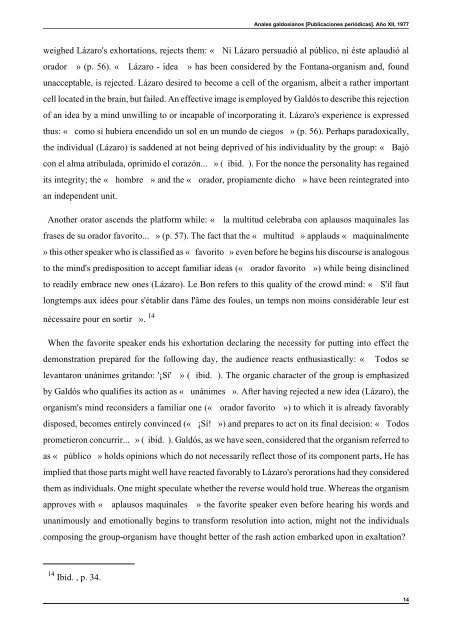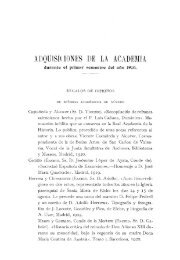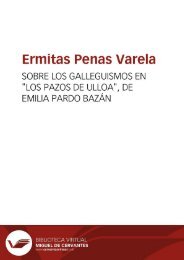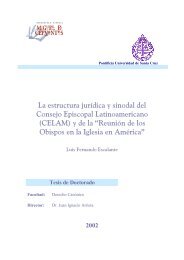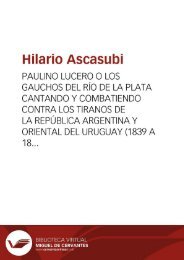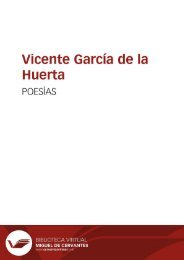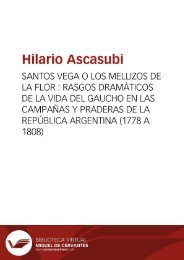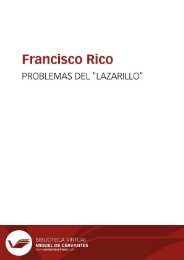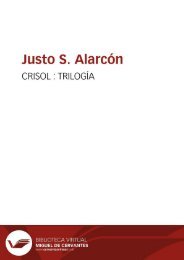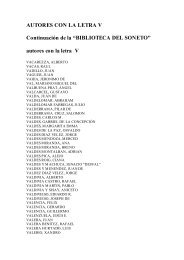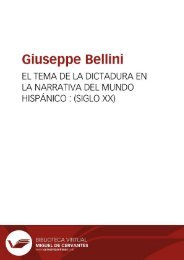Create successful ePaper yourself
Turn your PDF publications into a flip-book with our unique Google optimized e-Paper software.
Anales galdosianos [Publicaciones periódicas]. Año XII, 1977<br />
weighed Lázaro's exhortations, rejects them: « Ni Lázaro persuadió al público, ni éste aplaudió al<br />
orador » (p. 56). « Lázaro - idea » has been considered by the Fontana-organism and, found<br />
unacceptable, is rejected. Lázaro desired to become a cell of the organism, albeit a rather important<br />
cell located in the brain, but failed. An effective image is employed by <strong>Galdós</strong> to describe this rejection<br />
of an idea by a mind unwilling to or incapable of incorporating it. Lázaro's experience is expressed<br />
thus: « como si hubiera encendido un sol en un mundo de ciegos » (p. 56). Perhaps paradoxically,<br />
the individual (Lázaro) is saddened at not being deprived of his individuality by the group: « Bajó<br />
con el alma atribulada, oprimido el corazón... » ( ibid. ). For the nonce the personality has regained<br />
its integrity; the « hombre » and the « orador, propiamente dicho » have been reintegrated into<br />
an independent unit.<br />
Another orator ascends the platform while: « la multitud celebraba con aplausos maquinales las<br />
frases de su orador favorito... » (p. 57). The fact that the « multitud » applauds « maquinalmente<br />
» this other speaker who is classified as « favorito » even before he begins his discourse is analogous<br />
to the mind's predisposition to accept familiar ideas (« orador favorito ») while being disinclined<br />
to readily embrace new ones (Lázaro). Le Bon refers to this quality of the crowd mind: « S'il faut<br />
longtemps aux idées pour s'établir dans l'âme des foules, un temps non moins considérable leur est<br />
nécessaire pour en sortir ». 14<br />
When the favorite speaker ends his exhortation declaring the necessity for putting into effect the<br />
demonstration prepared for the following day, the audience reacts enthusiastically: « Todos se<br />
levantaron unánimes gritando: '¡Sí' » ( ibid. ). The organic character of the group is emphasized<br />
by <strong>Galdós</strong> who qualifies its action as « unánimes ». After having rejected a new idea (Lázaro), the<br />
organism's mind reconsiders a familiar one (« orador favorito ») to which it is already favorably<br />
disposed, becomes entirely convinced (« ¡Sí! ») and prepares to act on its final decision: « Todos<br />
prometieron concurrir... » ( ibid. ). <strong>Galdós</strong>, as we have seen, considered that the organism referred to<br />
as « público » holds opinions which do not necessarily reflect those of its component parts, He has<br />
implied that those parts might well have reacted favorably to Lázaro's perorations had they considered<br />
them as individuals. One might speculate whether the reverse would hold true. Whereas the organism<br />
approves with « aplausos maquinales » the favorite speaker even before hearing his words and<br />
unanimously and emotionally begins to transform resolution into action, might not the individuals<br />
composing the group-organism have thought better of the rash action embarked upon in exaltation?<br />
14 Ibid. , p. 34.<br />
14


